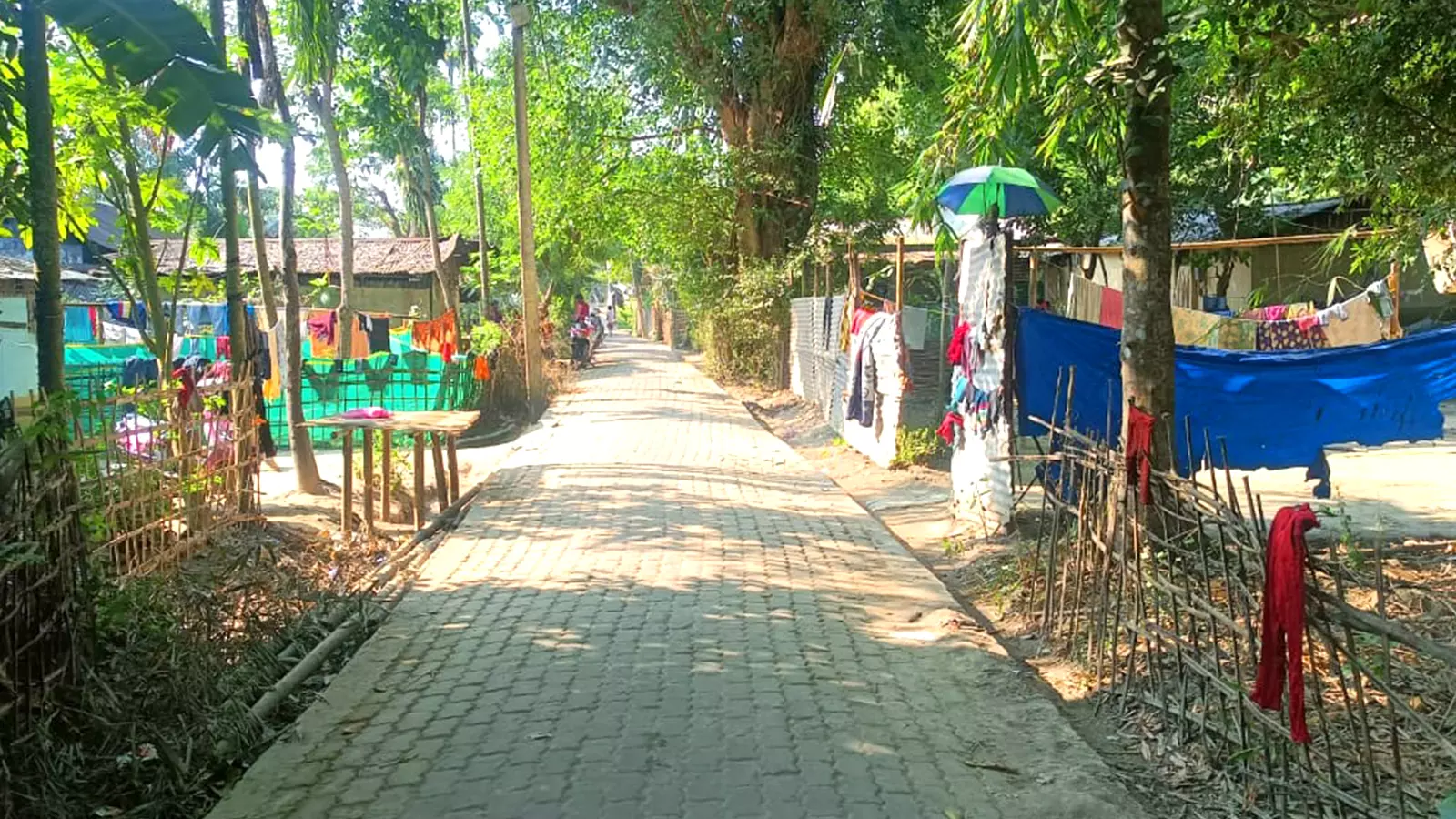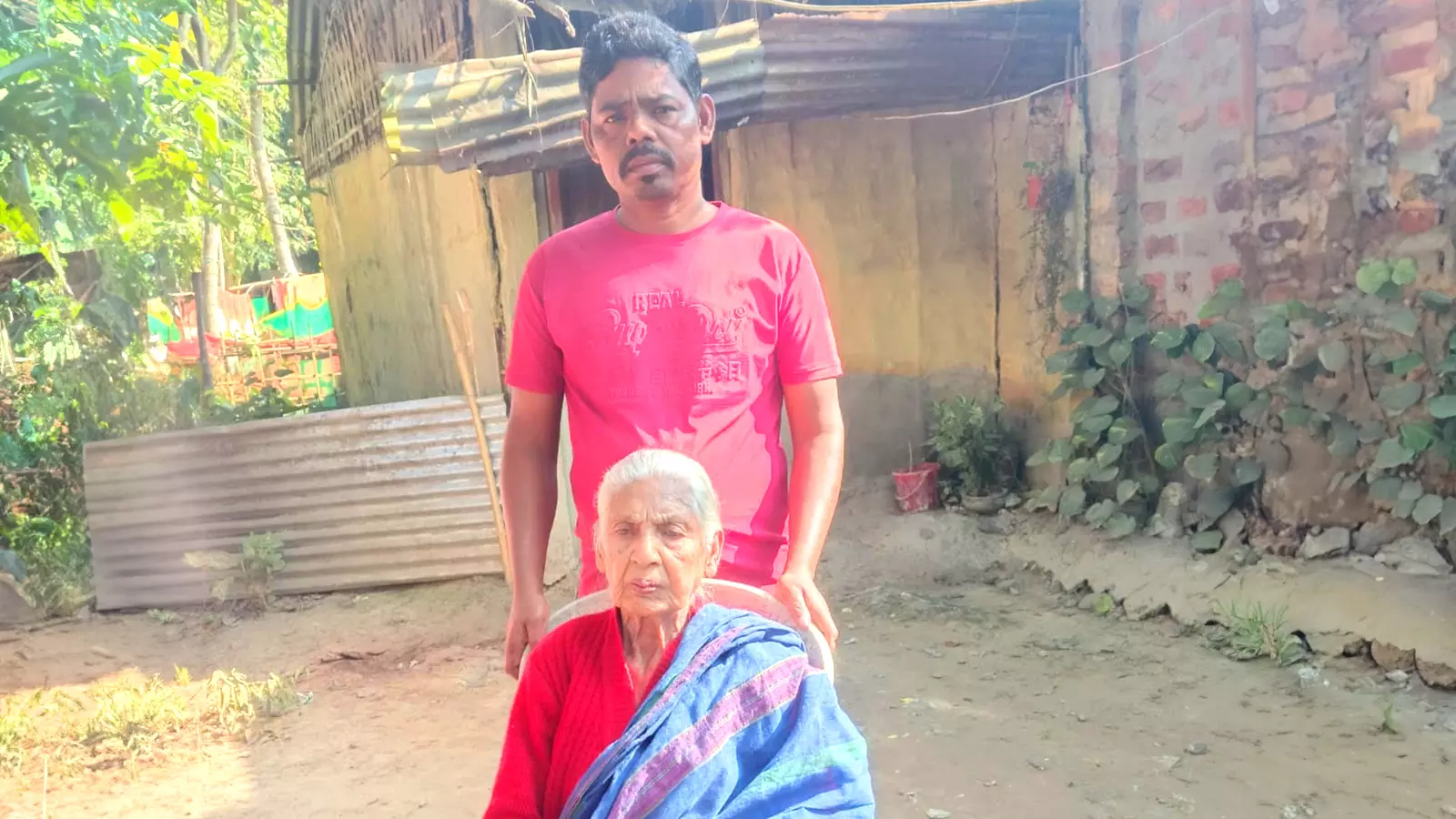
- Home
- India
- World
- Premium
- THE FEDERAL SPECIAL
- Analysis
- States
- Perspective
- Videos
- Sports
- Education
- Entertainment
- Elections
- Features
- Health
- Business
- Series
- In memoriam: Sheikh Mujibur Rahman
- Bishnoi's Men
- NEET TANGLE
- Economy Series
- Earth Day
- Kashmir’s Frozen Turbulence
- India@75
- The legend of Ramjanmabhoomi
- Liberalisation@30
- How to tame a dragon
- Celebrating biodiversity
- Farm Matters
- 50 days of solitude
- Bringing Migrants Home
- Budget 2020
- Jharkhand Votes
- The Federal Investigates
- The Federal Impact
- Vanishing Sand
- Gandhi @ 150
- Andhra Today
- Field report
- Operation Gulmarg
- Pandemic @1 Mn in India
- The Federal Year-End
- The Zero Year
- Science
- Brand studio
- Newsletter
- Elections 2024
- Events
Why Assam tea worker Subhadra Nayak turning 95 has left people shocked

The chilling winter has arrived in Cinnamara Tea Estate Assam's Jorhat but it has not affected the daily life of 95-year-old Subhadra Nayak, Assam’s ‘oldest living tea garden worker’ who has now become an iconic figure among the tea garden people. She goes around doing her usual chores, taking breaks to sit around with a stream of visitors who have recently started beelining...
The chilling winter has arrived in Cinnamara Tea Estate Assam's Jorhat but it has not affected the daily life of 95-year-old Subhadra Nayak, Assam’s ‘oldest living tea garden worker’ who has now become an iconic figure among the tea garden people. She goes around doing her usual chores, taking breaks to sit around with a stream of visitors who have recently started beelining her house.
Subhadra, the former tea garden plucker, adoringly called ‘nani’ by those around, has intrigued many tea garden people of Cinnamara Tea Estate, merely by turning a nonagenarian. Driven by a mix of awe and curiosity, people have of late been arriving in hordes at her dilapidated garden quarter to enquire about her. No.3 Sadar Line of Cinnamara Tea Estate, where Subhadra lives, is now a famous address where people are flocking to celebrate over nine decades of a life. While hitting nineties is not a surprising thing in other parts of India, in Assam’s tea gardens it is a rarity.
How Subhadra bucked the trend
Cinnamora Tea Estate, located just 10 km from Jorhat city, is the first tea garden of Assam established in 1850.
Subhadra has faint memories of her early years. All she can recollect is that over ninety years ago, she arrived at Deohall Tea Estate with her mother from Orissa (now Odisha), where the latter worked as a plantation worker. Subhadra grew up at Deohall Tea Estate in Tinsukia but after her marriage with Prahlad, she came to Cinnamara Tea Estate, which is nearly 200 km from Deohall, where she started working as a tea plucker.

No. 3 Sadar Line of Cinnamara Tea Estate, where Subhadra Nayak lives.
“Due to my old age, I have forgotten many things but I am staying with my daughter-in-law, Mamoni Bawari, who takes care of me. I worked as permanent worker at Cinnamora Tea Estate. My husband Prahlad worked in the same garden. After his death, it was tough to manage the daily expenses, but I managed somehow. Now, I am covered under the Orunodoi scheme and receive Rs 1,250 per month to run my monthly expenses,” she said.
What has kept her going? “A simple life,” says nani.
“When I worked as a tea plucker, I ate light food which included rice, roti and chera (flattened rice). I never consumed alcohol, which is very common for workers here, because I had seen people die after consuming alcohol in our tea garden,” she said.
Apart from the daughter-in-law, Subhadra is taken care of by her grandson Monesh Japap.
“Nani stays with her daughter-in-law Mamoni (56), who takes care of her, but Mamoni is also a tea plucker who has to go to work. Sometimes, I visit nani's house to enquire about her health. Nani had eight children, but they are no longer alive,” Monesh said.
“Unlike other tea garden women workers, nani always abstained from alcohol and that is the reason she is surviving without any disease. Nani is a living legend of our community because despite many hardships she didn’t compromise with her lifestyle,” said Monesh, who is also a permanent worker at Cinnamora Tea Estate.
Dying young in Assam
The reason why Subhadra’s story has caught everyone’s imagination is because the average lifespan of Assam’s tea garden workers is abysmally low. Subhadra stands out by living longer.
A 2014, UNICEF sponsored research of the Department of Sociology, Tezpur University, Assam, points that only 1.7% of the respondents of the study were 61 years old or older, indicating that very few live beyond 60 years of age. The study found that the average life expectancy among tea estate workers is very low compared to all-India expectancy of 68.9 years and also that of Assam where it is 65 years.
Tea-plucking business in Assam is mostly a women-dominated affair, and they make up more than 59% of the total workforce. But most of the women suffer from illiteracy, poverty, poor health, and a lack of awareness.
Another UNICEF study conducted along with Assam Medical College found that of the 14 meals in a week, only two are nutritional in a tea tribe family. Women and children from tea tribe families suffer from malnutrition from an early age. Another UNICEF sample study found 95 percent of women in the tea gardens to be anemic, which experts say is related to poor nutrition.
Anemia and malnutrition continue to cripple the tea garden women of Assam, making them most vulnerable to diseases like tuberculosis. Smoking, consumption of alcohol, poor quality of life, and poor housing, which debilitate the immune system, make them more vulnerable to developing tuberculosis. Anemia makes women particularly vulnerable during pregnancy and childbirth.
“Average life expectancy of a tea worker in Assam is mostly 50 to 60 years but Subhadra is a special case because of her diet. It has been seen that the tea garden people eat food which are not nutritious and consume spurious alcohol leading to early death,” said a health expert working in tea garden areas.
Speaking to The Federal, Dr Prasanta Borah, research scientist at RMRC-ICMR, who has done a research on the health sector of tea tribes, said, “The life expectancy of the tea garden workers is low compared to other tribes or people because of their lifestyle. They consume alcohol daily due to hard labour in tea garden. Most of them are suffering from high blood pressure because they consume a lot of salt in tea. During the pre-Independence period, Britishers engaged them in tea gardens and forced them to work hard by giving salt with tea to keep them energised which had later become a custom for them,” Dr Prasanta said.
“Anemia, hypertension, and eating food which is low on nutritional value are some major causes of high maternal mortality ratio among tea tribe women in Assam. Almost 90% young workers working in the tea gardens are anemic. Anemic conditions are caused by nutritional deficiency or low iron storage resulting from a previous pregnancy and heavy menstrual blood loss. This results in premature births and baby with low birth weight. In most anemic pregnancy cases, maternal mortality is an inevitable truth,” he said.
Craving nutrition
Low nutritional diet is pointed at as a major reason for low life expectancy among the tea tribe workers by several experts.
Assam Chah Mazdoor Sangha (ACMS), vice president Nabin Chandra Keot said, “Food habit is one of the reasons for their poor health. They don’t know what to eat. They have no idea about nutrition and they don’t eat nutritional food. The consumption of illicit liquor among the women and men are the prime reason for their poor health.”
“Since the women folk have to stand for up to eight hours every day plucking leaves in the tea gardens, they need special nutrition. Because they are denied nutrition and compelled to work for long hours, their children are born genetically weak. Tragically, they are bound to die young. A lack of education and complete government apathy are catalysts for this dismal state of affairs,” said Keot.

Subhadra Nayak with his grandson Monesh Japap.
Assam's tea tribe, or Adivasi community, is an umbrella term for people belonging to Munda, Santhal, Gond, Orang, Bhumij and other tribes. The comprise around 7 million of the 31.2 million people in the northeastern state of Assam.
Namita Gaur, a research scholar at Department of Anthropology in Dibrugarh University, said there are multiple factors due to which tea garden workers have low life expectancy.
“Socio-economic condition is one of the prime reasons because most of the garden labourers are poor and they are involved in hard working job. They don’t eat nutritional foods which have protein, minerals, vitamins, fibres etc. The intake of salt in tea instead of sugar is prevalent in their society since pre-independence period. Most of the women folk working in tea gardens are anemic because of their poor diet. The maternal mortality rate is higher in tea garden areas and Tinsukia district in Assam has the highest cases in maternal mortality rate,” Namita said.
Hypertension
According to a research published in the National Medical Journal of India, hypertension is emerging as a major public health problem in India.
In Assam, reports from hospitals in tea garden reveal a high prevalence of hypertension among workers in tea gardens. However, no systematic study has been carried out in this population.
The overall prevalence of hypertension was 60.8%. Increasing age, consumption of locally prepared alcohol, intake of extra salt in food and beverages and the addiction to khaini (smokeless tobacco product made from coarsely cut tobacco leaves and slaked lime paste) were found to increase the risk of hypertension.
Multivariate logistic regression models showed that the independent determinants of hypertension were age, gender, consumption of locally prepared alcohol and intake of extra salt. Gender-specific and age-stratified analyses showed the association of increased risk with intake of khaini in women only, while consumption of locally prepared alcohol was an important risk factor for hypertension in both men and women.
The back-breaking work in the tea gardens and squalid living conditions which most find impossible to escape compels women to find refuge in alcohol.
“Consuming alcohol is our custom, haria — made from fermented rice — is in our tradition. You will find the haria in every household. But over the years, it has been seen that many people in tea garden died due to consumption of liquor which is locally known as cholai. Cholai is an illegal alcoholic beverage which has an adverse impact on lives,” Siddhartha Karmakar, a local Assam Tea Tribes Students' Association (ATTSA) leader.
A reason for Subhadra nani’s popularity is that people are finding in her a ray of hope which is telling people how to live a life well.
“Subhadra nani is a living legend of our community because she has lived a healthy life. Many tea workers especially women tea pluckers are drawing motivation and encouragement from her on how to lead a good and healthy life. Tea garden workers are visiting her regularly to get encouragement and course-correct their lives,” said Karmakar.
